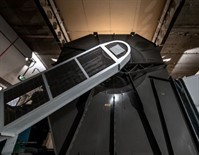Protecting British troops from biological warfare agents

The Challenge
The Defence Science and Technology Laboratory (Dstl) is
developing novel personal sampling technologies to detect
biological warfare agents, enabling troops in the field to be
better protected. However, current commercially available options
are impractical for many Ministry of Defence applications as they
require a separate sampler, pump and connecting tubing.
Dstl, in collaboration with the University of Hertfordshire, had
designed two personal samplers that operate as small standalone
devices. Both samplers were designed to collect as large a sample
as possible to maximise the probability of particle detection.
Dstl asked a team of HSE scientific experts, including
microbiologists and aerosol specialists, to determine the
efficiency of the new samplers in order to assess whether they were
suitable for use in the field.
The Solution
Inside the large wind tunnel facilities at HSE's Buxton Science
and Research Centre (pictured above), the samplers were challenged
with aerosols of dust and bacterial spores at two different wind
speeds.
The Outcome
HSE's unique facilities and established methods enabled
independent testing of the prototype technologies. The results
generated from the trial will assist Dstl in carrying out
operational analysis studies on the effectiveness of using personal
sampler or personal biological detection technologies on military
operations. If the personal sampling concept is taken forward by
the Ministry of Defence, then this data can be used to help define
equipment specifications for optimal protection of military
personnel.
Back to the top